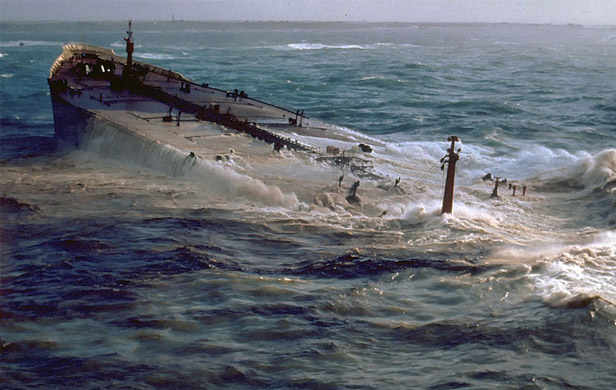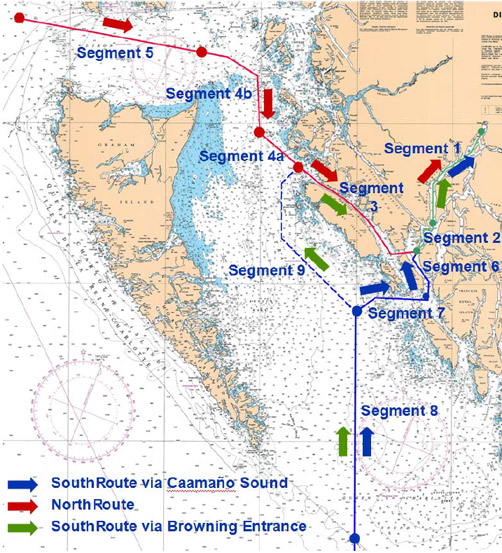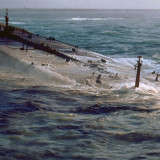
While the Harper Government reacts to this week’s release of a federal report containing 45 recommendations on improving oil spill response capabilities on BC’s coast, a group of professional engineers is launching a campaign to point out the flaws in Enbridge’s tanker safety plans.
Concerned Professional Engineers (CPE) is a BC-based group boasting “many decades of experience in the design, construction and operation of large projects for the extraction and transportation of natural resources like coal and oil.”
Enbridge downplaying spill risks
The group recently kicked off an online “crowd funding” campaign to help publicize its work, which has involved in-depth analysis of Enbridge’s tanker plans and detailed submissions by its members to the National Energy Board hearings on the project. They say Enbridge’s claim of a 10% oil spill risk from tankers connected to its proposed Northern Gateway pipeline is far too low.
“We’ve performed our own, independent review and found Enbridge’s analysis to be lacking,” says CPE.
[quote]This is not good engineering.
[/quote]
Some of the group’s key concerns are as follows:
- Enbridge provides no justification or documentation for the ‘scaling factors’ they used to calculate the 10% risk of a major spill.
- Enbridge’s liability ends when the tankers leave the terminal. Who’s responsible for a spill along the narrow 300 km waterway from Kitimat to the open ocean?
- Enbridge’s risk analysis planned for 220 tankers per year through Douglas Channel. New LNG projects will bring that number to over 600.
- Federal scientists, testifying during the JRP hearings, say more research is needed on diluted bitumen before they can be sure a cleanup is even possible.
CPE also focuses on the proposed tanker route down BC’s treacherous coast:
[quote]The proposed route to the open ocean is nearly 300 km (186 miles) long through constrained channels, some of which are less than 1400 m (4600 ft) wide. This may seem large until you realize that the proposed ships are more than 300 m (1,000 ft) in length and can take several kilometers to slow down or stop. Furthermore, the route is on the northern BC coast, a place famous for its challenging weather, winds, waves, and heavy fog.[/quote]
Getting the word out
The group, whose members were official interveners in the National Energy Board’s Northern Gateway Joint Review Panel, is seeking to raise $20,000 to produce and distribute educational media that goes into detail about the real risks posed by Enbridge’s plan. It is careful to point out that it is not opposed to development and trade, rather to unsafe practices:
[quote]We are not opposed to the development and export of natural resources, but we feel very strongly that these projects must be done in a safe and responsible manner, with a full accounting of the risks and visibility to the public.[/quote]
First Nations still unconvinced by safety measures

First Nations leaders who attended a press conference held Tuesday in Vancouver by Natural Resources Minister Joe Oliver and Transportation Minister Lisa Raitt were also disappointed with the government’s reaction to the new federal report on tanker safety measures, compiled by a panel of three experts appointed by the government.
In particular, Coastal First Nations President Art Sterritt told me after the conference, “There were no new technological advancements in spill clean-up and no commitment from the government to follow the report’s recommendation of removing an oil spill liability cap for operators.”
As it stands, oil spill liability along the tanker route is capped at $161 million – something the federal report recommends changing – but Oliver and Raitt have shown no indication of acting on that point.
Federal departments question tanker safety
The report follows the revelation that a number of federal departments – including Fisheries and Oceans and Transport Canada – concurred in a 2010 meeting that “Enbridge had not submitted enough information on the pipeline route,” according to a 2012 Postmedia story drawing on Access to Information documents.
More risks coming down the pipeline
It isn’t just oil tankers that are stirring up concerns with Enbridge’s proposal. Independent economist and former ICBC CEO Robyn Allan has also flagged the lack of safety with Enbridge’s proposed pipeline across northern BC, noting the province lags far behind other jurisdictions in terms of funding for oil spill preparedness – despite claims of “world-leading” safety. In a recent Tyee op-ed, Allan said neither Enbridge nor the province have made any real progress on meeting Premier Christy Clark’s pipeline safety condition – one of 5 for endorsing Northern Gateway.
Allan raised the increased risk of moving diluted bitumen by pipeline – a core concern for CPE with tankers in the marine environment – which the BC Liberal Government seized upon during its own submission to the Joint Review Panel, but seems to have subsequently forgotten:
[quote]The province also raised unique challenges posed by diluted bitumen when it sinks in fresh water. Enbridge consistently denied this at the hearings, despite its own spill experience with the Kalamazoo River in Michigan. Enbridge did not include the results of the Kalamazoo spill in its statistics or analysis of spill risk. Enbridge aggressively resisted filing as evidence the U.S. National Transportation Safety Board (NTSB) report on how the company handled the spill at the hearings.[/quote]
The CPE campaign runs for another three weeks on the crowd funding website Indiegogo – which has become a popular grassroots fundraising tool in recent years.


This is from the same Harper government that has shut down west coast lighthouses and removed coast guard stations
I don’t think most of the public grasp the attack on the protections that the Harper government are eliminating from tanker safety. Firstly, aerial surveillance is merely a means of detecting spills that have occurred not preventing them. The increase in pollution response equipment is for AFTER there is a spill, not prevention. The area from Kitimat to the open sea is one of the most treacherous on the coast. Ask BC Ferries who have the Queen of the North sitting on the bottom near Gil Island, with absolutely no intention of recovering it or recovering the large amount of fuel oil that continues to gurgle up to the surface and will forever.
It took the Cdn Coast Guard and the government 70 years to ramp up and respond to a WWII wreck the Brig. General Zalinski whose heavy bunker fuels were causing concerns in the Hartley Bay community for over a decade.No action at all until the government realized it needed the good will of first nations to put tankers through the area,
Not much media attention was paid to the fact, the ship still carries live 500lb bombs aboard, nor that cruise ships regularly pass within less than a mile from this unstable wreck. So the Coast Guard spends several months ramping up to recover a few tons of oil from a sunken wreck. The price tag a mere $50 million. No word if the Conservative government will go after the ship owner, the US government for clean up costs. The international liability limits imposed by the International Maritime Organization will never be near the amount needed for convenience flagged state ships with foreign owners enough to even touch a spill that tankers from the Kitmat will carry.
In 1985 a Tanker Exclusion zone was established on the west coast of Canada, which will not be adhered to once this pipeline is built. Which means, all those Alaskan north slope crude tankers can now steam as they see fit through Canadian waters http://www.tc.gc.ca/eng/marinesafety/menu-4100.htm#f
The reason the tanker exclusion is to allow time for assist tugs to arrive in case of a tanker becoming disabled and prevent it from drifting onto shore. No such measures are being proposed by the Enridge proponents, no response tugs in the Charlottes, or anywhere else other than escorting them down Douglas Channel, where they will return to Kitimat.
Then there is the fact, which the government doesn’t want you to know about a deep sea three years ago that ran straight into a cliff along the shoreline in bad weather in Douglas Channel (the proposed route of tankers) with pilots aboard and full compliment of navigation officers. Pilots will board off tankers and be sent into Hecate Strait, some of the most treacherous waters on the west coast. It is well documented on the west coat that foreign flag ships with foreign crews have very poor understanding of the local geography and very poor english while dealing with making passing arrangements with shipping which leads to numerous close calls each year. Most are prevented by the Coast Guard vessel traffic centres, however, the Harper government is closing those in Ucluelet, Comox and Vancouver Habour.
One of the occurrences of such is the collision off the west coast of Vancouver Island between the fish factory ship Tenyo Maru and the Tuo Hai. Here was a case where the chinese flagged ship (same that will carry cruide) Tuo Hai, had such a poor understanding of the english language the ships deck officers were oblivious to the calls on the radio from Tofino Traffic / Coast Guard to warn them of the danger they were standing into with a collision. A number of crew aboard the fish factory ship died and the wreck still on the bottom continues to burp up oil, which the Transport Canada aircraft track on a regular basis. The report on this wreck is here http://www.tc.gc.ca/eng/marinesafety/tsb-1995-m91w0004-m91w0004_synopsis-1712.htm
In essence, what the Harper government is going is closing down the three of the five Coast Guard MCTS Centres (that prevent tanker and other marine accidents) on the west coast and at the same time ramping up it’s proposal to increase tanker traffic on the west coast ports of Vancouver and Kitimat.
As far as Exxon Valdez goes, there were several factors here at play. The vessel traffic centre in monitoring traffic, had no radar coverage for Bligh Reef where the tanker strayed off course and ran aground. The fact the master (Capt Hazelwood) was alleged to be intoxicated and left the watch to a junior watchkeeper, didn’t help matters. With the closure of the Coast Guard vessel traffic centre in Vancouver, where officers are able to visually monitor movement of traffic, due to its limited ability to cover the entire harbour, e.g. radar blind areas (aka Valdez approaches) and often prevent dangerous interactions between smaller vessels and those that could cause significant pollution even in Vancouver Harbour.
Bottom line is, why is a government so hell bent on bringing more tankers to the west coast while systematically dismantling the PREVENTION measures that are currently in place, but ramping up the ability to CLEAN UP a spill. Seems this government has it all wrong, as we know prevention is always far more cost effective! A reminder to the public, when Minister Joe Oliver held a press conference about tanker safety in Vancouver, that the pollution response vessel in the background came from Victoria, which is 11 hours away and ran aground enroute to the press conference, http://www.vancouversun.com/news/spill+clean+ship+sandbar+route+government+news+conference+Vancouver/8129094/story.html
The argument of double hulls is of little comfort, given the sea conditions and topography of the west coast, there is no way, a double hull won’t be breached, for example when a collision happens http://www.marinelink.com/news/singapore-collide-kelana334372.aspx nor will it withstand the waves and wind conditions on the rugged west coast shoreline, clean up and containment in those weather condition is impossible and we will have oil on our shores for generations.
The Harper government is paying lip service to the people of BC about tanker safety and it is time the industry and government were exposed for the truth’s that they conveniently omit!
Don’t forget that those same ships will be owned by some obscure Chinese venture with no accountability whatsoever and crewed by sailors of multiple origins and all overworked and underpaid.
Some readers may remember the AMOCO Cadiz, the oil tanker that grounded on the coast of France.
At the time a large number of people, particularly students, mobilized from all parts of Europe to try cleaning the beaches. It has to be appreciated that the beaches of France are far more accessible than those of BC.
Speaking with a sailor friend who was sailing in the region of the disaster this past summer, he reported that there is still considerable evidence of oil on the beaches and that local seafood harvesting is still having to deal with oil impact.
Why anyone would want to take the chance of having this to content with on the BC coast is beyond understanding.
I believe independent scientific review will only take us forward unlike political review which is an endless dance to rationalize profit taking. Our elected officials need to bring natural science back to every table in every discussion about our environment. Universities also need to be brought back to their independent role as the ‘sober second thought’.
Thanks, Damien and Rafe, for the important work you do to protect our beautiful province from the scourge of bad decisions made by people who do not understand that everything is inter connected.
“Furthermore, the route is on the northern BC coast, a place famous for its challenging weather, winds, waves, and heavy fog.”
…and u don’t think guys that are trained to drive boats this big are trained to handle situations like that as well? the pipeline is going in, all the crybaby hippies can just get used to it.
Crybaby hippies?? You a throwback from the 60’s or something or just a plain red neck name caller.
Highly trained experts manage to sink ships and crash planes every day. It’s typically called “human error”. We also have that “minor” thing called mechanical breakdown.
In other words, humans eventually make mistakes and machinery eventually fails. If those things happen in a hazardous waterway, in bad weather, the results will be catastrophic and impossible to repair.
Anybody who has spent any time on the waters of the central and north coasts of BC shudders at the thought of a massive increase in supertanker traffic through those islands and channels.
In a word, “No.” Look at all the accidents that have happened just this year alone, and then tell me, with a straight face, that you believe the industry hype. The facts are clear: government has allowed industry to put profit before every other consideration.
Did you even read this article?
I have not been persuaded that the tankers moving natural resources through our pristine British Columbia waterways has been truthfully explored…..I pray that our government sticks to their guns when it come to the safety of our shorelines…..we can’t afford another Val Deas accident in our waterways…..and Enbridge should be liable for the tankers after they leave port and proceed to their destination…..it’s their oil that would be spilled into our Pacific Ocean and adjoining pathways and sounds…..I disagree with the products being moved by cargo ships through our waterways…..
How can we ignore experts in the field over a newly elected MP with no background except to agree with Harper wants?? Clark will not honor her word, big oil unfortunately will buy everyone off.